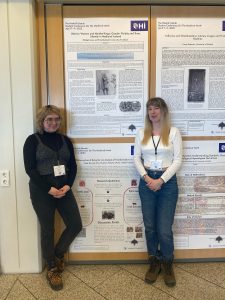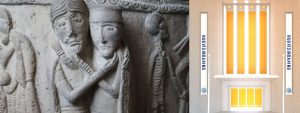Bridget, one of our Master students, has just presented a poster with Ema Grey Bushnell at the 11th University of Iceland Student Conference, The Medieval North, held 7-9 April 2022. The poster title was ‘Warrior Women and Maiden-kings: Gender Fluidity and Trans-Identity in Medieval Iceland’. Congrats to Bridget and Ema!
Author: Sif Ríkharðsdóttir
Session on emotion sponsored by project!
The project organised and sponsored a session on emotion at the Annual Congress of the Humanities, held at the University of Iceland 11-12 March 2022. All the ‘local’ team members presented their early findings, from syntactical characteristics of emotion verbs in Old Icelandic to embodied emotions and hybridity. Below is a description of the session:
Emotion in Medieval Language and Literature: Body, Medicine and the Emotional Self
This session will consider the mediation of emotion in medieval literature and language. The focus will be on the interaction and intersections between the body and the presumed emotional self, the borders between the internal and external and the role of medicine in the understanding of emotions. Moreover, the session will consider how emotions might have been perceived, understood and mediated – as somatic, medical or cognitive experiences – based on both linguistic structure and their literary interpretation. The session forms part of the international research project ‘Emotion and the Medieval Self in Northern Europe’ that is funded by the Icelandic Research Fund.
Þórhallur Eyþórsson – The Syntax of Sorrow: The Syntactic Characteristics of Some Verbs of Emotion in Old Icelandic
Sif Ríkharðsdóttir – Pain and Emotionality in Old Norse Literature
Caroline Batten – Illness, Embodied Emotion, and Old Norse Medicine
Meritxell Risco de la Torre – Hybridising Emotion: Selfhood and Emotionality in Jean d’Arras’s Mélusine ou la Noble Histoire de Lusignan
See programme
PI gives a keynote!
 Sif Ríkharðsdóttir gave the keynote lecture at the conference ‘Love and Emotion in Old Norse Literature: Patterns, Formulae, Reality’ held at the University of Tartu 27-29 January 2022. The title of the talk was ‘”Þeim var ek verst er ek unna mest“: The Concept of Love in Old Norse Literature’.
Sif Ríkharðsdóttir gave the keynote lecture at the conference ‘Love and Emotion in Old Norse Literature: Patterns, Formulae, Reality’ held at the University of Tartu 27-29 January 2022. The title of the talk was ‘”Þeim var ek verst er ek unna mest“: The Concept of Love in Old Norse Literature’.
Photo credit: University of Tartu photographer (University of Tartu website)
New team members!
Please welcome our newest team members!
 Bridget C. Leary is one of the project’s MA students. She holds a BA in Classics from University College London and is currently working on her MA thesis for the Viking and Medieval Norse Studies programme at the University of Iceland. Her thesis will analyse emotionality in the poem Sonatorrek when removed from the narrative of Egils saga in which it is now typically embedded. Her work will compare emotive scripting in the poem with other examples from the thirteenth-century emotive canon, and use the resulting evaluation as an inroad into the controversy around the date of the poem’s original composition. Her overall aim is to assess the implications that placing the poem’s composition in a thirteenth-century context would have for understandings of medieval self and identity both constructed (through the poem) and revealed (through the process of construction).
Bridget C. Leary is one of the project’s MA students. She holds a BA in Classics from University College London and is currently working on her MA thesis for the Viking and Medieval Norse Studies programme at the University of Iceland. Her thesis will analyse emotionality in the poem Sonatorrek when removed from the narrative of Egils saga in which it is now typically embedded. Her work will compare emotive scripting in the poem with other examples from the thirteenth-century emotive canon, and use the resulting evaluation as an inroad into the controversy around the date of the poem’s original composition. Her overall aim is to assess the implications that placing the poem’s composition in a thirteenth-century context would have for understandings of medieval self and identity both constructed (through the poem) and revealed (through the process of construction).
 Maximillian Jesiolowski is an MA student in the Viking and Medieval Norse Studies program at the University of Iceland and holds a bachelor’s degree in Archaeology and Ancient History from Monash University in Australia, with minors in Music and History. For his MA thesis, he aims to examine emotional states and communal and individual identities in Grettis saga Ásmundarsonar and how these concepts are reflected in the portrayal of landscape and natural environment in the saga.
Maximillian Jesiolowski is an MA student in the Viking and Medieval Norse Studies program at the University of Iceland and holds a bachelor’s degree in Archaeology and Ancient History from Monash University in Australia, with minors in Music and History. For his MA thesis, he aims to examine emotional states and communal and individual identities in Grettis saga Ásmundarsonar and how these concepts are reflected in the portrayal of landscape and natural environment in the saga.
We look forward to working with them and welcome them to our team!
Meritxell elected to the board of Hugdok!
 Meritxell has been elected to the board of Hugdok, the Association of Doctoral Candidates and ECRs at the School of Humanities, from 1 January 2022 onward. Hugdok‘s purpose is to protect and advocate for the interests of doctoral students and ECRs at the School of Humanities. We congratulate Meritxell on the election and look forward to see her promote the work of doctoral students and postdoctoral researchers in this new venue!
Meritxell has been elected to the board of Hugdok, the Association of Doctoral Candidates and ECRs at the School of Humanities, from 1 January 2022 onward. Hugdok‘s purpose is to protect and advocate for the interests of doctoral students and ECRs at the School of Humanities. We congratulate Meritxell on the election and look forward to see her promote the work of doctoral students and postdoctoral researchers in this new venue!
Grants for MA students!
We are looking for a new team member! See the ad below for information on the funding options, application deadline and other details!
Grants for MA students-spring 2022
Grants for MA students
Applications are invited for a grant to work on a MA thesis in Comparative Literature for the Spring term of 2022 under the supervision of Sif Ríkharðsdóttir, Professor of Comparative Literature, in connection with the international research project “Emotion and the Medieval Self in Northern Europe”, which is funded by the Icelandic Research Fund (RANNÍS).
The grant is a full grant for the thesis semester: 479.000 ISK (including employment related costs) per month for four months, or 1.916.000 ISK in total (including employment related costs). The thesis should entail either a in-depth case study of the correlation betwen emotion and selfhood in a single Old Norse literary work or, alternatively, engage with the interplay between emotion and selfhood in medieval Nordic literature in general. The project encompasses secular texts from roughly 1200-1500, but the theses can tackle any genre (or historical sources) that are best suited to the topic. Further information about the research project and the team, which the MA student would be joining, can be found here: https://medievalemotion.hi.is/.
The applicants should preferably be MA students in Comparative Literature, although applications from related fields will also be considered. Applicants should preferably have a background in medieval studies or a knowledge of medieval literature. The following documents should be included with the application: 1) transcript of graduate studies, 2) curriculum vitae and 3) short description of the proposed project (250-400 words). It is vital that the description detail how the thesis will be connected to the project.
The application should be marked “MA studies-Emotion and Self” and sent to the School of the Humanities: Hugvísindasvið, b.t. Eiríks Smára Sigurðarsonar, Háskóla Íslands, Aðalbyggingu, 101 Reykjavík no later than 15 November, 2022. For further information on the project please contact Sif Ríkharðsdóttir (sifr@hi.is) and for information on how to apply or details of the grant please contact Eiríkur Smári Sigurðarson (esmari@hi.is).
CFP for the final conference to be held in Iceland in May 2022!
CALL FOR PAPERS
University of Iceland, Reykjavík, Iceland
25-27 May 2022
The conference ‘Emotion and the Medieval Self in Northern Europe’ is the final event in a funded international research project. It aims to bring together a broad range of scholars working on emotion and/or selfhood in medieval literature to explore the interconnections between emotions and the medieval self across Northern and Western Europe. Selfhood is understood here as a literary selfhood, i.e. the narrative representation of a presumed subject. We are looking to foster comparative dialogue regarding the multilingual and cross-cultural representation of emotion and selfhood across Northern Europe and beyond.
Topics of interest could include (but are not limited to):
- The performance of emotion and its relation to selfhood
- Narrative staging of emotion and the presumed self
- Cultural contingencies of narrative emotionality and self-representation
- The borders of the narrative self and the illusion of ‘interior’ emotionality
- Embodied emotions
- Historicity and fictionality of emotion
- Emotion and audience reception
Plenary speakers include:
- Guillemette Bolens, Université de Genève
- Gareth Evans, University of Oxford
Proposals are invited on any of the topics above. To submit a proposal please send 300 word abstract and a brief curriculum vitae (max one page) to medievalemotion@gmail.com by 15 December 2021. General inquiries should be sent to sifr@hi.is. Notifications will be sent out by 1 Feb 2021. The conference is planned as an in-person event and registration is free of charge. The organisers plan to publish a special issue of selected papers in a peer-reviewed journal. Further information about the project can be found here: https://medievalemotion.hi.is/
PI speaking on emotion in Oxford!
Timothy Bourns to give a lecture in the Medieval Centre
Timothy Bourns
Driftwood and the Divine: Ecocritical Readings of trémenn
Thursday, November 28, 2019, at 16.30
Lögberg 101

This presentation will examine trémenn and the ways in which the categories of human and wood intersect in Old Norse literature, both metaphorically and metaphysically, thus blurring the lines between human and non-human, sentient and non-sentient, mind and matter.
Þorleifs þáttr jarlaskálds—the tale of Þorleifr, the earl’s poet—provides an introductory case study, telling of a Norwegian king who calls upon his tutelary goddesses, the sisters Þorgerðr Hǫrgabrúðr and Irpa, to help him construct a trémaðr assassin out of a piece of driftwood and a human heart, which he sends to Iceland to kill the poet who shamed him. This wooden character is named—Þorgarðr—given clothes, and is able to walk and talk.
Drawing on wide-ranging examples, I will explore the ways in which this type of pre-Christian figure was imagined in post-conversion Iceland (e.g., the wooden idols of Freyr in Gunnars þáttr helmings and Óláfs saga Tryggvasonar en mesta); how trémenn are imbued with emotional interiority and selfhood (e.g., the ashamed trémenn in Hávamál and the tearful trémaðr in Ragnars saga loðbrókar); and how bark acts as both metaphorical and literal clothing (e.g. the Birkibeinar in Sverris saga and the Næframaðr in Örvar-Odds saga). Evidence from Sonatorrek and other skaldic verse provides parallel evidence, with a diverse range of kennings figuratively linking people with trees.
I will also analyse why driftwood in particular is used as a building material for human-tree hybrids (e.g., Askr and Embla in Gylfaginning); the symbolic connection between driftwood and fate (e.g., Ingólfr’s high-seat pillars in Landnámabók); how natural objects can be granted vitality and narrative agency (e.g., Þuríðr’s cursed driftwood in Grettis saga); and how this might relate to medieval Icelandic thinking about wood, trees, and a changing environment with limited natural resources.
I will thus argue for the merits of a more expansive, post-humanist, object-oriented, material ecocriticism to provide new readings of the Old Norse-Icelandic literary environment.
Timothy Bourns is graduate of the Medieval Icelandic Studies Master’s program. He wrote his doctoral thesis about animals in Old Norse literature at the University of Oxford, and now he is a postdoctoral researcher on the international project ‘Emotion and the Medieval Self in Northern Europe’ based at the University of Iceland.
The talk will be delivered in English. All are welcome to attend.
Blog on Workshop I (Utrecht)
From the 13th to the 15th of November, we held our first Emotion and the Medieval Self in Northern Europe workshop in Utrecht, Netherlands, and by all accounts it was a great success. On the first afternoon, Frank Brandsma led a round of general introductions and Sif Ríkharðsdóttir introduced and outlined the project; then Timothy Bourns led a discussion of key terms and working definitions and Carolyne Larrington concluded with the aims and goals of the workshop. Having prepared ourselves for the next day’s discussion of emotion and selfhood in medieval Dutch, Norse, and German romance, we had a joyful dinner at the charming pancake house De oude Muntkelder, before heading back to the Court Hotel for an early night.
 The second day featured the texts themselves; participants were asked to share a passage in advance which they then presented for group discussion in the workshop, as we aimed to utilise key terms (emotion, self, performativity) to articulate possible cultural contingencies of emotive performativity or selfhood, textual idiosyncracies, cross-cultural traces, and linguistic characteristics. In the opening Dutch Session, Frank Brandsma (Utrecht) presented on Queen Guinevere’s madness and loss of self in Lanceloet, Martine Veldhuizen (Utrecht) on Constantine and the weeping mothers in Jacobus de Voragine’s Legenda Aurea, and Chloé Vondenhoff (Iceland and Utrecht) on Perceval’s memory loss and penitence in Perchevael.
The second day featured the texts themselves; participants were asked to share a passage in advance which they then presented for group discussion in the workshop, as we aimed to utilise key terms (emotion, self, performativity) to articulate possible cultural contingencies of emotive performativity or selfhood, textual idiosyncracies, cross-cultural traces, and linguistic characteristics. In the opening Dutch Session, Frank Brandsma (Utrecht) presented on Queen Guinevere’s madness and loss of self in Lanceloet, Martine Veldhuizen (Utrecht) on Constantine and the weeping mothers in Jacobus de Voragine’s Legenda Aurea, and Chloé Vondenhoff (Iceland and Utrecht) on Perceval’s memory loss and penitence in Perchevael.
Following lunch, textual discussion turned northwards with the Norse Session, starting with Carolyne Larrington (Oxford) on Blensibil’s sighting of Kanelangres and lovesickness in Tristans saga ok Ísöndar, Timothy Bourns (Iceland) on animal emotionality and the lion in Ívens saga, and Sif Ríkharðsdóttir (Iceland) on Íven’s madness and emotive performance in Ívens saga. Ending the day’s discussion was the German Session, with Miriam Edlich-Muth (Düsseldorf) presenting on the negotiation of joy in Der Stricker’s Daniel von Blühenden Tal, Lucie Kaempfer (Oxford) on Partonopier’s fear before meeting Meliur in Konrad von Würzburg’s Partonopier und Meliur, Lena Zudrell (Vienna) on narratorial selfhood in Wolfram von Eschenbach’s Parzival and Hartmann von Aue’s Erec, and Cora Dietl (Giessen) on the various shades of embarrassment in Parzival. After a very full, lively, and productive day of close reading and collaboration, we had a delicious workshop dinner at De Rechtbank in the Court Hotel.
On our third and final day, we concluded our discussion with comments from Bart Besamusca (Utrecht), who sat in on the workshop and provided valuable feedback on the project and its aims. We also revisited our working terms and definitions and discussed the project’s broader aims and goals in detail, before having a final lunch at Grand Café Luden. Thus concluded our first workshop, and we now look forward to our next gathering in Oxford in March, 2020, where we will examine emotion and selfhood in Middle English, Anglo-Norman and Old French, Welsh, Irish and Scots romance, once again exploring how emotion is conveyed and how such emotive performance contributes to constructing a notion of selfhood in the medieval North. We sincerely thank all of the participants for an incredibly instructive, engaging, and enjoyable workshop in Utrecht. We hope to stay in touch and see each other again before long!





